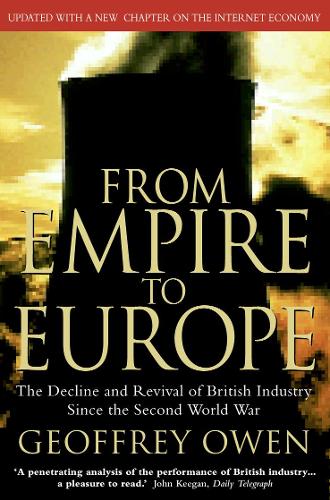
From Empire to Europe: The Decline and Revival of British Industry Since the Second World War
(Paperback)
Publishing Details
From Empire to Europe: The Decline and Revival of British Industry Since the Second World War
By (Author) Geoffrey Owen
HarperCollins Publishers
HarperCollins
29th November 2000
United Kingdom
Classifications
General
Non Fiction
European history
Economic history
Industrialisation and industrial history
Economic growth
International trade and commerce
Economics of specific sectors
Business strategy
338.094109045
Physical Properties
Paperback
544
Width 129mm, Height 198mm, Spine 30mm
381g
Description
That Britain's industry has been in decline for 50 years is hardly disputed, yet the causes of this slide are still hotly contested. Some have attributed it to poor management, over-weening trades unions and incompetent government; others have aimed their fire at the financial markets, or deficiencies in education and training. Opinion is equally divided on the long-term value to Britain of the Thatcher era, which changed the face of the British industrial base. Through an engaging, accessible analysis of British industry since 1945, Geoffrey Owen argues that since the late 70s British industry has underdgone a painful but necessary transformation, which has rapidly modernized the UK economy. He analyses the interaction between individual firms, industries and countries, demonstrating the influence of national institutions and policies on which types of industry are likely to succeed.
Reviews
'Engaging and knowledgable... A very well-written volume.' Lord Hanson, Management Today 'Thoughful, serious and convincing' Martin Taylor, Sunday Telegraph
Author Bio
Geoffrey Owen was born in 1934 and educated at Rugby and Balliol college, Oxford. He joined the Financial Times immediately after his national service, initially as a feature writer, then as US correspondent and industry editor. He joined the governments Industrial Organization Corporation as an executive and spent three years at British Leyland before returning to the Financial Times as deputy editor in 1974, becoming editor in 1981. Having been knighted in 1988, he left the Financial Times in 1990 and is currently director of Business Policy at the London School of Economics.
